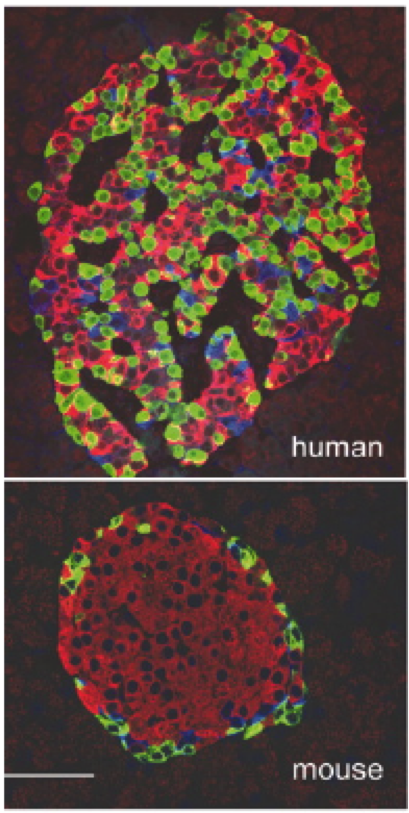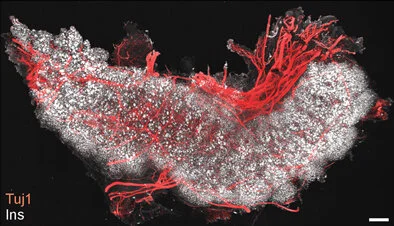Department of Developmental Biology and Medicine (Oncology)
Stanford University School of Medicine
Beckman Center B300
279 Campus Drive
Stanford, CA 94305-5329
Contact:
Seung K. Kim, MD, PhD
Office: 650.723.6230
See video highlighting recent work by the Kim lab on pig islet development!
Organ development and functional restoration
Understanding organ development and achieving functional restoration of diseased organs is a broad goal motivating effort in our group. Pancreatic islets of Langerhans, endocrine organs that secrete insulin and glucagon, have emerged as a paradigm for investigating both organ development and restoration. Deficiency of insulin-producing islet β-cells or their function underlies the pathogenesis of diabetes mellitus, a disease with devastating autoimmune (type 1), pandemic (type 2), and exocrine-associated (type 3c) forms. However, islet replacement, or preservation in diabetes, is ultimately limited by our inadequate understanding of mechanisms controlling islet formation, growth and immunological protection. To discover these mechanisms, my laboratory is using a combination of genetic, developmental, immunological, physiological and genomic approaches in different experimental systems, with a focus on several fundamental questions:
What are the cellular, molecular, signaling and genetic mechanisms regulating pancreatic development and functional maturation?
Can we harness our growing understanding of pancreatic islet development to generate replacement islets for diabetes, including islet cells generated from human stem cell lines?
What are the genetic programs underlying diabetes risk?
What immunological and transplantation paradigms can be developed to protect native or replacement islets in type 1 diabetes?
Can we advance understanding of normal pancreas development and function to discover the basis of devastating exocrine pancreatic diseases, including pancreatic cancer?
Cabrera et al. 2006, PNAS
Hsueh et al. 2017, Sci Reports
To address these challenges, our group has developed new approaches in mice, fruit flies, pigs, primary human pancreatic cells, and multipotent human stem cells. Each of these systems offers different experimental advantages. Discoveries from our systems have created unprecedented opportunities for harnessing knowledge about pancreatic development and growth to restore pancreas islet function, and to identify the molecular, genetic, signaling, and immune basis of pancreatic diseases like diabetes mellitus, pancreatitis and pancreatic cancer. Please use these links to more information about projects in pancreas and islet development, islet regeneration and reconstitution, diabetes genetics, immune regulation of islets and pancreatic cancer.
We have developed new experiential science instruction for secondary school students and have implemented these fruit fly-based curricula through our Stan-X programs in multiple schools, worldwide. Thus, work with fruit flies in our group is advancing our understanding of diabetes genetics and provides a unique framework for innovating science education and training the next generation of science teachers.



